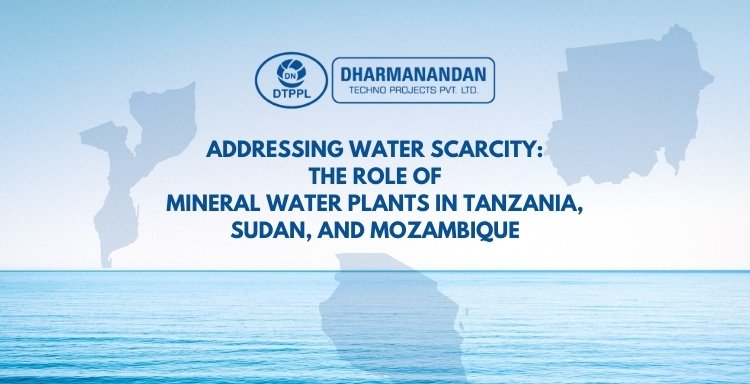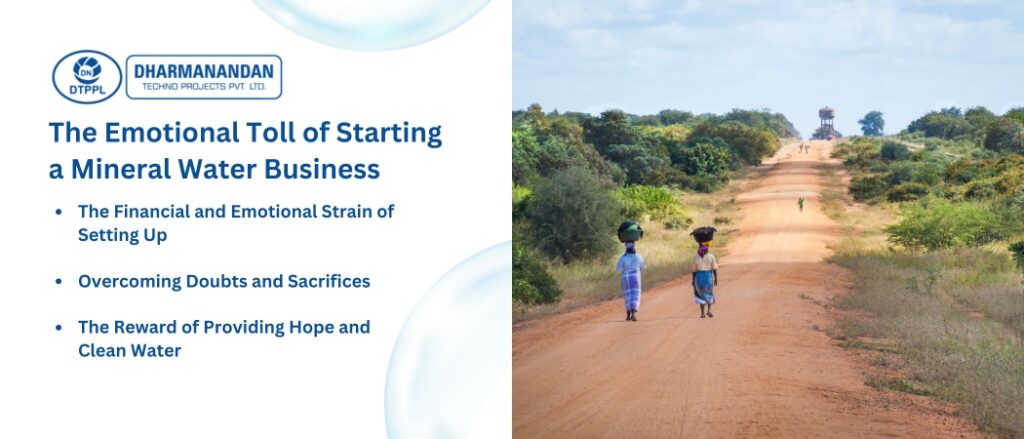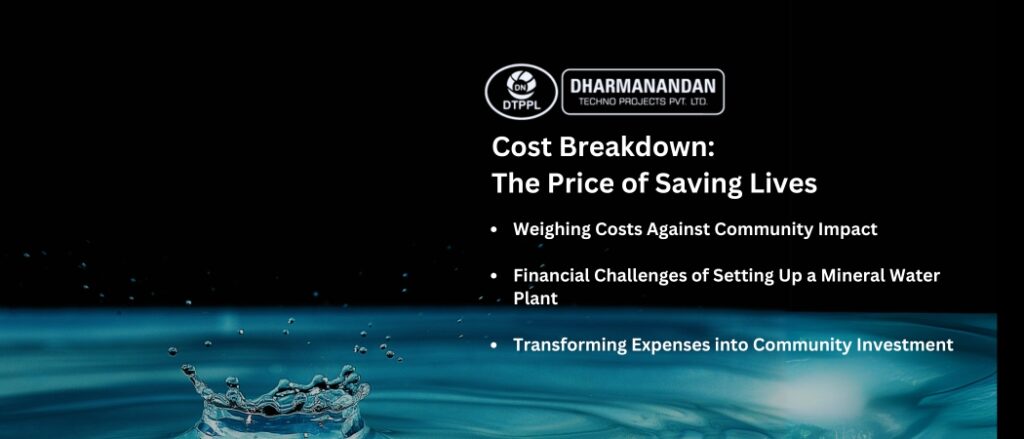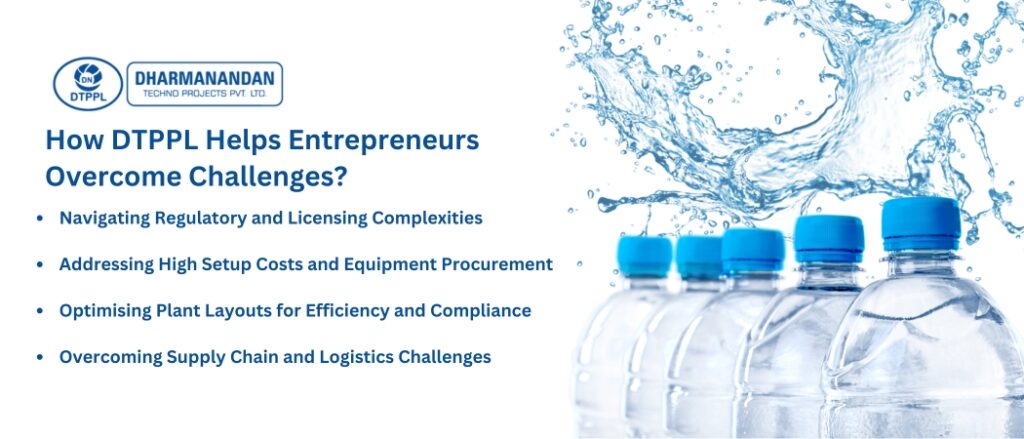
Table of Contents
Addressing Water Scarcity: The Role of Mineral Water Plants in Tanzania, Sudan, and Mozambique
December 31, 2024
The blazing African sun rises each morning over Tanzania, Sudan, and Mozambique, where the land cracks under the weight of water scarcity. For millions, the sound of rushing water is a dream, a desperate hope carried in dusty winds. The story of how mineral water plants are emerging as a lifeline in these countries isn’t just one of business; it’s a tale of pain, perseverance, hope, and ultimate triumph.
Water Crisis: A Heart-Wrenching Reality
Picture a village in rural Tanzania. Mothers wake up before dawn, exhausted but driven by the instinct to keep their families alive. They carry heavy clay pots, hands cracked from years of water-fetching, as they walk for hours under the unforgiving sun. This is a daily ritual marked by pain, fatigue, and the ever-present fear of not finding clean water. Children who should be in school instead trudge along dusty paths, hoping the nearby stream hasn’t dried up.
This story isn’t just Tanzanian; it echoes across Sudan and Mozambique. In Sudan, communities live in fear of waterborne diseases. The Nile River, once a symbol of life, now poses health risks due to pollution. In Mozambique, flooding and droughts play a cruel game, alternating between too much and too little water. These struggles demand more than sympathy—they demand action.
How Mineral Water Plants Bring Hope
Amid this harsh reality, the idea of a mineral water plant feels like a beacon of hope. It’s not just about purifying water; it’s about saving lives, restoring health, and bringing joy to families who haven’t tasted clean water in months. Mineral water plants offer more than just a product; they offer dignity and the chance for communities to thrive.
In Tanzania, a group of local entrepreneurs, driven by the desire to make a difference, launched a mineral water plant in Tanzania. With sheer determination and limited resources, they navigated countless obstacles. The plant now provides thousands of litres of safe, mineral-rich water daily, transforming lives and reducing the long treks once endured by mothers and children.
The Emotional Toll of Starting a Mineral Water Business
Starting a mineral water plant business in Africa isn’t as simple as it sounds. Entrepreneurs in Sudan have shared gut-wrenching stories of sleepless nights and empty bank accounts. The cost of setting up a mineral water plant is a heavy burden, from purchasing expensive mineral water equipment to securing land and meeting regulatory requirements. Some risk everything, even mortgaging their homes, while doubts gnaw at them: “Will this dream ever come to life?”
Yet, as the first drops of purified water flow from their machines, a wave of relief and achievement washes over them. In Sudan, where the battle for clean water has claimed lives, every bottle filled represents hope. The emotional struggle is real, but the triumph is worth every sacrifice.

Mineral Water Plants in Sudan: Turning Challenges into Opportunities
Setting up a mineral water plant in Sudan is a test of willpower and endurance. The regulatory landscape is a maze, with endless paperwork and requirements. Entrepreneurs must battle bureaucracy, securing licenses and ensuring compliance with health and safety standards. Sudan’s unpredictable political climate adds another layer of stress, with policies that can change overnight, threatening to derail everything.
But despite these obstacles, success stories are emerging. One such story is of a young engineer who returned to Sudan from abroad, determined to make a difference. Faced with the challenge of sourcing reliable mineral water machines, he persevered, eventually partnering with local and international suppliers. His plant now serves hundreds of families, and the pride in his voice when he says, “I’m giving my people a chance at a healthier life,” is unmistakable.
Mozambique: The Unpredictable Battle with Nature
Mozambique’s relationship with water is complicated. In some areas, floods devastate entire villages, while other regions are gripped by unrelenting droughts. The emotional toll of losing crops, homes, and loved ones to water extremes is overwhelming. The idea of building a mineral water plant in Mozambique comes with its own set of fears: What if the investment is washed away in a flood? What if the droughts continue, making water purification unsustainable?
Despite these fears, courageous souls step forward. Entrepreneurs, aware of the mineral water plant setup cost, pour their hearts into projects that can transform communities. A Mozambican woman, inspired by the loss of her brother to a waterborne disease, launched her own plant. She invested in robust mineral water equipment, designed to withstand nature’s fury. Today, she watches with pride as schoolchildren drink clean, cold water from her plant, their laughter echoing like a melody of hope.
The Role of Technology and Innovation
In a world where water scarcity is a growing concern, technology plays a vital role. Mineral water machines are at the core of these life-changing plants, purifying water efficiently and ensuring it meets health standards. However, the mineral water machine price can be prohibitive. In Tanzania, one entrepreneur described the crushing moment when he realized he couldn’t afford the equipment he needed. But instead of giving up, he looked for alternative solutions, sourcing second-hand machines and partnering with NGOs for support.
Innovation is also key. In Mozambique, some mineral water plants utilize solar-powered machines, cutting costs and ensuring sustainability. Others experiment with advanced purification techniques, ensuring the mineral content remains beneficial. This constant quest for improvement shows the resilience and ingenuity of people determined to bring clean water to their neighbors.
Cost Breakdown: The Price of Saving Lives
Talking about the mineral water plant cost isn’t just about numbers; it’s about weighing hope against reality. The expenses are considerable: land acquisition, equipment purchases, labour, and maintenance. For instance, the 20 ltr jar mineral water plant cost can set back an entrepreneur by thousands of dollars. But what’s the cost of doing nothing? Communities continue to suffer, children fall ill, and futures are lost to preventable diseases.
In Sudan, a business owner detailed the pain of watching his savings dwindle as he struggled to keep his plant afloat. But with persistence and support from local partners, his plant became profitable. Today, he not only covers his costs but also invests back into the community, funding health education and local development projects.

The Journey from Pain to Prosperity
For those who take the leap, the journey from struggle to success is marked by moments of deep vulnerability and incredible achievement. In Tanzania, one mineral water plant owner recalls the sheer joy of seeing the first truckload of bottled water leave his plant. The water that once seemed so elusive was now a source of life, health, and even economic opportunity for his community.
In Mozambique, where water scarcity once felt like a curse, the sight of a functioning mineral water plant feels like a miracle. For the families who receive clean water, it’s not just a drink—it’s a chance for a better tomorrow.
A Brighter Future for Tanzania, Sudan, and Mozambique
The impact of mineral water plants goes beyond quenching thirst. It’s about empowering communities, building resilience, and creating new opportunities. In Tanzania, a young girl who used to spend hours collecting water now dreams of becoming a teacher, her days no longer consumed by the search for survival. In Sudan, once-desperate farmers now work with renewed hope, as clean water allows them to grow crops and support their families.
Mozambique’s once-scarred landscape is slowly healing, thanks to the determination of those who believe in change. The ripple effects of every investment in a mineral water plant are profound, turning despair into hope and pain into progress.
How DTPPL Helps Entrepreneurs Overcome Challenges?
At Dharmanandan Techno Projects Private Limited (DTPPL), we understand the unique challenges entrepreneurs face when setting up a mineral water plant. Here’s how we help overcome these hurdles:
Challenge 1: Regulatory and Licensing Complexities
Securing necessary certifications and navigating licensing processes can be overwhelming for entrepreneurs.
Solution: We provide step-by-step guidance, handle documentation, and ensure compliance wih regulatory standards, allowing you to focus on operations confidently.
Challenge 2: High Setup Costs and Equipment Procurement
The expense of acquiring machinery and maintaining it in challenging environments is a major concern.
Solution: We offer cost-effective machinery, durable equipment suited for extreme conditions, and maintenance programs to minimize operational costs.
Challenge 3: Inefficient Plant Layouts
Improper plant design leads to inefficiencies, wasted space, and regulatory non-compliance.
Solution: We create customized plant layouts optimized for workflow, compliance, and maximum productivity, adhering to the legal standards.
Challenge 4: Supply Chain and Logistics Issues
Sourcing raw materials and safely transporting machinery to remote areas are common hurdles.
Solution: Our supplier network ensures consistent delivery of quality materials, while specialized packaging and trusted logistics partners ensure equipment arrives safely and on time.


Conclusion
Addressing water scarcity in Tanzania, Sudan, and Mozambique is about more than just infrastructure; it’s about people, resilience, and the power of the human spirit. Mineral water plants are making a difference, one drop at a time, and while the journey is fraught with challenges, the impact is life-changing. Entrepreneurs who embark on this path aren’t just investing in a business; they’re investing in humanity, transforming the fate of entire communities and proving that hope, like water, is a force that can never truly be contained.
At Dharmanandan Techno Projects Private Limited (DTPPL), we are committed to empowering these visionaries. From navigating regulatory hurdles to designing efficient plants, providing durable machinery, and offering technical support, we are here to turn challenges into opportunities.
Ready to make a difference? Partner with DTPPL to bring clean, safe drinking water to your community. Let’s build a future where water scarcity becomes a story of the past. Contact us today to start your journey.
